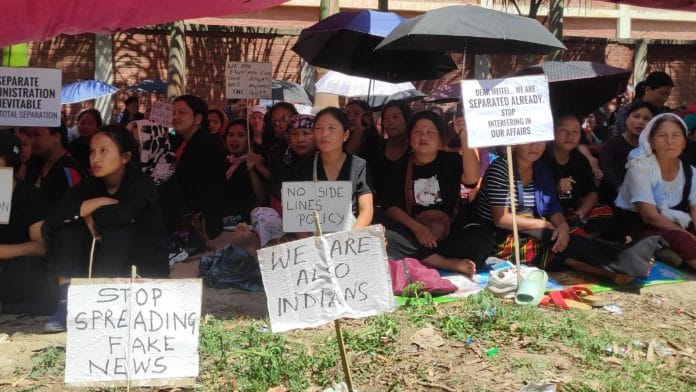Prime Minister Narendra Modi’s rise to power in 2014 brought hope for progress and empowerment, particularly for women. However, over time, the reality has proven to be quite different. India has witnessed alarming instances of violence against women in recent years, with incidents like the Kathua gang rape, Unnao gang rape, and Hathras gang rape coming to the forefront. These incidents, along with the harassment of women wrestlers and the online abuse faced by women in the Opposition parties and female journalists, raise serious concerns about the safety and empowerment of women in the country. The latest is the rape of Kuki women in Manipur.
Unfortunately, the approach of the current ruling party has been contradictory and detrimental. Over the past nine years, the focus has been on dictating women’s clothing choices and imposing restrictions, diverting attention from the essential issue of empowering women. This regressive approach of the BJP has derailed the cause of women’s rights in India. Therefore we must not make the mistake of looking at these cases in isolation.
More horrifying are instances of shielding culprits like POSCO-accused BJP MP Brij Bhushan Sharan Singh and those convicted in the Bilkis Bano case, and dismissing the Hathras rape incident as an international conspiracy. The message to the people is loud and clear — the government is absolutely not concerned with the increasing rate of crime against women. On the contrary, men can be assured that such crimes will not result in punishment. There is a lot one can get away with in Modi’s India.
Abuses hurled at women on social media have become a daily affair. Many of those that partake in this bullying are members of the ruling party, some even boast of being followed by the prime minister himself.
In the face of each distressing incident, we are left grappling with disbelief, hoping that this would be the tipping point, when things can’t possibly get any worse. Yet, to our dismay, we find ourselves witnessing a distressing pattern of worsening conditions for women’s safety. God knows what it will take for us to act.
Also read: No one wants to talk about rapes in Manipur. There’s a silence at the heart of the violence
Manipur rapes
The recent video of two Kuki women being stripped naked and sexually assaulted underscores the challenges in delivering justice. Transparency in the investigation process is crucial, especially when the accused individuals remain unidentified in the FIR. This ambiguity hampers the quest for justice and raises doubts about the government’s resolve to hold perpetrators accountable. Given that the incident took place in early May and only came to the forefront on Wednesday, the delayed outrage is understandable. But there is no excuse for the home minister to not have this information and accordingly take timely action. He even visited Manipur very briefly last month.
I wonder how the wrestlers, and all the other women who await justice, might feel today. No amount of achievements can guarantee respect. As women, we find ourselves with little confidence in the central government even as we continuously question and demand accountability from our leaders. The safety and security of our homes and lives are at stake, and we get no answers.
When the protests by Indian wrestlers made headlines, we hoped it would serve as a turning point in the battle against gender-based violence in sports. If sportspersons of global recognition struggle to obtain justice, the path to justice for ordinary women becomes even more challenging.
Our worst fears are coming true, thanks to the inaction of the government. This might only be the tip of the iceberg if we don’t wake up. The message being conveyed to both perpetrators and victims of sexual harassment and abuse is clear — women’s voices are not heard, and their safety is not a priority. This portrayal of women’s vulnerability is disheartening for a country known for its ancient culture and traditions of respecting women.
The Prime Minister himself has been known to make insensitive statements concerning women. It does not set a positive example to emulate. In 2012, right after the cabinet reshuffle of the UPA government, Modi called Shashi Tharoor’s then wife, the late Sundanda Pushkar, “a Rs 50-crore girlfriend” and even referred to Mamata Banerjee, the Chief Minister of West Bengal, as “didi o didi“. Confronting this harsh reality becomes necessary. In this moment of sheer hopelessness, ultimately, we women rely on each other for solidarity and support.
To my complete shock, the Minister for Women and Child Development, Smriti Irani, only spoke out after the video went viral. Ultimately, setting a precedent for women’s empowerment and safety starts from the top, and leaders must prioritise women’s rights and welfare. True women’s empowerment can only be achieved through good governance, as the late Sushma Swaraj believed.
Regardless of political affiliations, it is time for women to unite and demand justice for victims of sexual harassment and abuse.
A viable solution to these pervasive issues seems like a distant dream, and sincere steps in the right direction appear to be elusive. Indian politicians, especially the BJP, should not forget the upheaval that the Congress government faced following the devastating Nirbhaya episode. The fact that the BJP ascended to power in the aftermath of that tragic incident should remind it that the increasing number of sins against women are all signs of its departure from power. Power that the people of this country bestowed on them, fifty per cent of which are women.
The audacity to neglect the cries of dying sisters and children displayed by the prime minister, home minister, and women and child development minister will not be forgiven. Our scriptures have rightly noted, “vinash kale viprit buddhi” (When bad times come, one goes against their better judgement).
As far as the Modi regime is concerned, that time has come.
Abhinandita Dayal Mathur is the national spokesperson of the Aam Aadmi Party. She tweets @abhinandita_m. Views are personal.
(Edited by Theres Sudeep)






